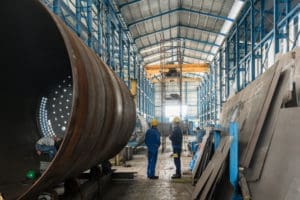 Q: We serve primarily healthcare and finance companies, but our region has a robust manufacturing base. Are there many opportunities for MSPs in manufacturing? If so, are there any insights you can provide about taking clients in this vertical?
Q: We serve primarily healthcare and finance companies, but our region has a robust manufacturing base. Are there many opportunities for MSPs in manufacturing? If so, are there any insights you can provide about taking clients in this vertical?
If you are thinking of pursuing industrial clients, you won’t need any special equipment or software that is different from what you use elsewhere. What you will need, however, is the ability to forge relationships, build trust, and think quickly.
Bob Martin is the President of Avon, Ohio based Great Lakes Computer Corporation, which provides IT services to companies within a swath, from Toledo to Youngstown, an area which is quintessentially known as the “Rust Belt.” It’s an area where manufacturing runs deep, with food processors, plastics, tool and die, and metal shops juicing the economy.
The auto industry and steel manufacturing may be king in this area, but there are thousands of smaller manufacturers producing products that feed into the larger industrial ecosystem. Many of these are small manufacturing operations with a front-office, where the suits sit and the welding goggles gleam.
 “Many of these are family-owned businesses and they have a lot of pride in what they do, so they have more of a stake in their business,” Martin explains. That’s where you have to build relationships in a way you might not have to do with the local medical establishment.
“Many of these are family-owned businesses and they have a lot of pride in what they do, so they have more of a stake in their business,” Martin explains. That’s where you have to build relationships in a way you might not have to do with the local medical establishment.
“We have to prove ourselves,” Martin says in regard to his manufacturing clients.
“We are their IT staff”
In most of the manufacturing businesses that Great Lakes services, there is no IT staff. As Martin simply puts it, “We are their IT staff.”
Martin and his team do everything, from overseeing vintage 1970s-era technology to rapidly changing IoT developments. According to Martin, telling the manufacturers what they don’t need is as important as what they do.
“You don’t have to sell them every tool in the chest.” For instance, some cybersecurity tools are very expensive.
“Most of our customers simply can’t afford it, so we do a cost-benefit analysis. I’ll tell them that something is a great tool, but it’s beyond your budget, so we can do some other things instead. They appreciate that.”
A big part of the job is knowing and empathizing with your customer’s finances. For MSPs eyeing industrial clients, not all are state-of-the-art connected operations.
“You need a breadth of knowledge. The skills of being adaptive and creative are crucial,” details Martin. There could be an old stamping machine with a controller that is a glorified PC and suddenly his team must find a motherboard from the 1970s to replace the aging one in a failing machine. It could be a heater motor designed in the 1960s which has to work with a connected IoT thermostat.
According to Martin, “We deal with those things on a daily basis,” adding that many smaller manufacturers are struggling with implanting new technologies, trying to sift through whether upgrades are affordable and whether they make their product better. Martin and his team serve as IT specialists and manufacturing consultants.
Martin attests that the plant’s staff will inquire: “If I can make this widget and make it internet-connected, how can you help me make it work?” Sometimes Great Lakes can help, while other times they steer their customers towards sources that can.
Small manufacturers are really being pushed by supply chain partners to upgrade. There is a lot of pressure from partners to build IoT machines.
Meanwhile, one area where manufacturing may have less pressure is in regulation. Hospitals, a more typical MSP customer, need to be HIPAA compliant and financial firms have a host of data regulations.
“Regulatory pressures are not as front-leading in manufacturing,” explains Martin. He does note that you often have the dual systems to monitor, with the actual factory floor equipment and the front office.
“That is where their lifeblood and finances are. Everyone is very concerned about security.”
“No typical day”
Great Lakes has a great mix of experience among its dozen or so field technicians. Some have decades under their belts and know exactly how that motherboard from 1979 functions, while others are fresh graduates of cutting edge tech programs.
This mix of experience creates an in-house nurturing process, where tech talent can move up the ranks. A lot of his business challenges are logistics, such as getting the right tech to the right place at the right time, with clients spread across northern Ohio’s manufacturing hinterlands.
“There is no typical day and I think that is what our workers like. We have planned projects, but in the blink of an eye, a server could be down, and that throws a proverbial wrench in the gears. Much of the challenge is the shuffling of talent and figuring out who should go where,” illustrates Martin.
As IoT and connectivity reach into even the most dated facilities, Martin expects the opportunities for MSPs to grow in this sector.
“With the current climate we are in, small manufacturing is very strong,” reports Martin.
The industrial sector provides a great opportunity for MSPs to take advantage of. Just be prepared for a client where building relationships is just as important as building firewalls.
Photo: Kzenon / Shutterstock

Thanks for Sharing your Information.